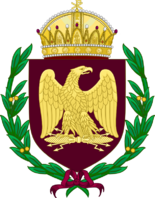Factions in the Latin Senate
This article lists political parties and organizations in the Latin Empire. Latium is a functioning parliamentary democracy with a constitutional monarchy. The first political parties began to officially form in the mid 1860s at the advent of the political reforms of Theophylactus I Augustus. Initially these parties formed around prominent figures in the Senate, often reshuffling at every election. Today, the two largest parties are the center-right United Latium and the center-left Progressive Party.
| This article is part of a series on the |
| Politics of Latium |
|---|
 |
History
The election of 1866 was the first time in which political parties began to officially form. While previously members of a sitting Senate would form blocs, there was never any cooperation between members except for matters of voting, eg. there was no campaigning. The first parties formed immediately following the first general election in 1866, when a majority of the Senate supported Peter Claudius, 34th Duke of Adrianople to be appointed Consul by the Emperor. Days after The Duke of Adrianople was made Consul, his followers in the Senate formed the Imperial League party. Within the next month, the Liberal Party and Hellene Imperial Party formed among senators of like minds. Often times in this period, the League and the Hellenes agreed to a vote sharing agreement where they would support one another in forming a government and the League would refrain from running members in Hellenic seats. From 1866 until 1907, the League, Liberals and Hellenes were the only parties to hold seats in the Senate. The first party system lasted from 1866 until 1907.
In 1907, the Union Alliance, a national unity centrist party became the fourth party to gain election into the Senate. From 1907 until August 1932, the government and Consulship were only held by either the Imperial League or the Liberal Party. Government coalitions were much more common in this time period, with the Union Alliance joining the League controlled government in 1915 and 1930, while the Communists and Socialist joined the Liberal appointed government in 1922.
The August 1932 snap election marked the end of the second party system and the beginning of the third, with the first government and Consulship not held by the League or Liberals. Instead a new, far-right, nationalist party, the National Social Workers Movement. The National Social Workers first entered the Senate in 1922, winning 9 seats, however it was mistaken by many voters as a socialist party at the time. Following the August 1932 snap election, the NSWMP formed a highly controversial minority government after both the League and Liberals failed to form functioning governments. The NSWMP government was repeatedly blocked in passing any legislation, causing party leader and Consul Gregoras Rulliu to urge Emperor Constantine XIX for another snap election. In the September 1932 snap election, the NSWMP earned enough seats for a near full majority, though there were many accusations of voter intimidation and even riots in select polling places. The NSWMP would win every election from 1932 until 1941, nearly doubling their seat totals every election. By 1937, the many minority parties were effectively banned or barred from standing for election into the Senate by Consul Rulliu, with the Liberals and League eventually being banned before the suspended 1945 election.
After the devastation of the Social War, many parties reformed or simply folded. The fourth party system began when the Imperial League and the Hellene Imperial Party formally merged to create the Conservative and Imperial Party. The Conservatives continue to claim and legally hold the right to name themselves as the only successor to the Imperial League and share history of the League as their own. However, not all members of the Greek Imperials were happy with the Conservative merger as the two parties were gradually moving in opposite directions even before the Social War. Some prominent members of the Hellenes left to form the Hellene National Party, others to form the Enoménos Éllines. The first election after the war took place in 1955 and saw the Conservatives earn victory, with the Catholic Voters Party and newly formed National Democratic Party earning a chunk of seats.
The fourth party system lasted from 1955 to 1995. From this period, every government and Consulship would be come from the ranks of the Liberal party and the Conservative Party, with the only coalition government forming in 1990 between the Conservatives and the Union Alliance. Some argue as to whether the fifth party system begins in 1990 or 1995, as 1990 was the election that would eventually result in the Progressive Party quickly arising; however, 1995 is most often the accepted date. The Progressives would first contest for seats in the 1995 general election, forming out of disaffected Liberals following the 1991 Liberal leadership election, and an eventual absorption of the National Democrats.
Today, Latium remains in the fifth party system with the Progressives replacing the Liberals as one of the two major parties alongside the Conservatives. The Progressives first held the Consulship in 1998 until the election fraud-ridden 2000 election, and again from 2001 until 2013. Both the 1998 and 2000 elections were wrought with controversy; in 1998, the Conservatives losing big after the revelation of the Group of Ten financial scandal; and in 2000 where an investigation of electoral fraud was ordered by Jason VI Augustus after the Latin First Party won an outright majority and other parties earning a near equal proportion of seats as others.
The 2017 election saw a shift towards what some are calling the next shift in the Latin political party system.
Parties
Minor Parties
Below is a list of officially registered political parties that do not hold seats on any elected council or elected office.
- United Communities
- New Imperial Party
- New Conservative Party
- Christian People's Alliance
- Legalize It Party
- Workers Front
- Imbrosian National Party
- Latin National Party
- More Freedom More Rights
- Liberal Conservative Party
- Pirate Party
- Gelonian Unity
Banned Parties
On occasion, political parties can be banned. This remains a rare occurrence in the modern era, and typically only occurs in extreme circumstances, such as when a party is found to take part in electoral fraud, political violence, or otherwise utilizes "aggressive and combative methods" to secure electoral success.
| Party Name | Founded | Disbanded | Ideology | Reason | |
|---|---|---|---|---|---|
| National Social Workers Movement Party | 1920 | 1955 | Latin Fascism | Attempted violent overthrow of the Monarchy, et. al. | |
| Communist Party | 1911 | 1995 a | Communism | Violent protests | |
| Popular Party | 1955 | 1979 | Far-right, ultranationalism | Voter intimidation, assaulting voters. | |
| Gelonian National Front | 1929 | 1967 | Far-right, ultranationalism | Ties to Gelonian terrorist organizations | |
| Latin First Party | 1980 | 2001 | Far-right, ultranationalism, Second Wave | Election fraud, rigging the 2000 general election. | |
| Popular Social Party | 2001 | 2017 | Latin nationalism, Populism, Second Wave, Hard Belisaroscpeticism | Crimes of treason and active role in the 2016 coup attempt. |
a The Communist Party has been banned on three separate occasions, twice being overturned. Originally banned in 1933, reinstitute in 1955; second ban occurred in 1980, overturned upon special appeal to Curiate Assembly in 1986.


